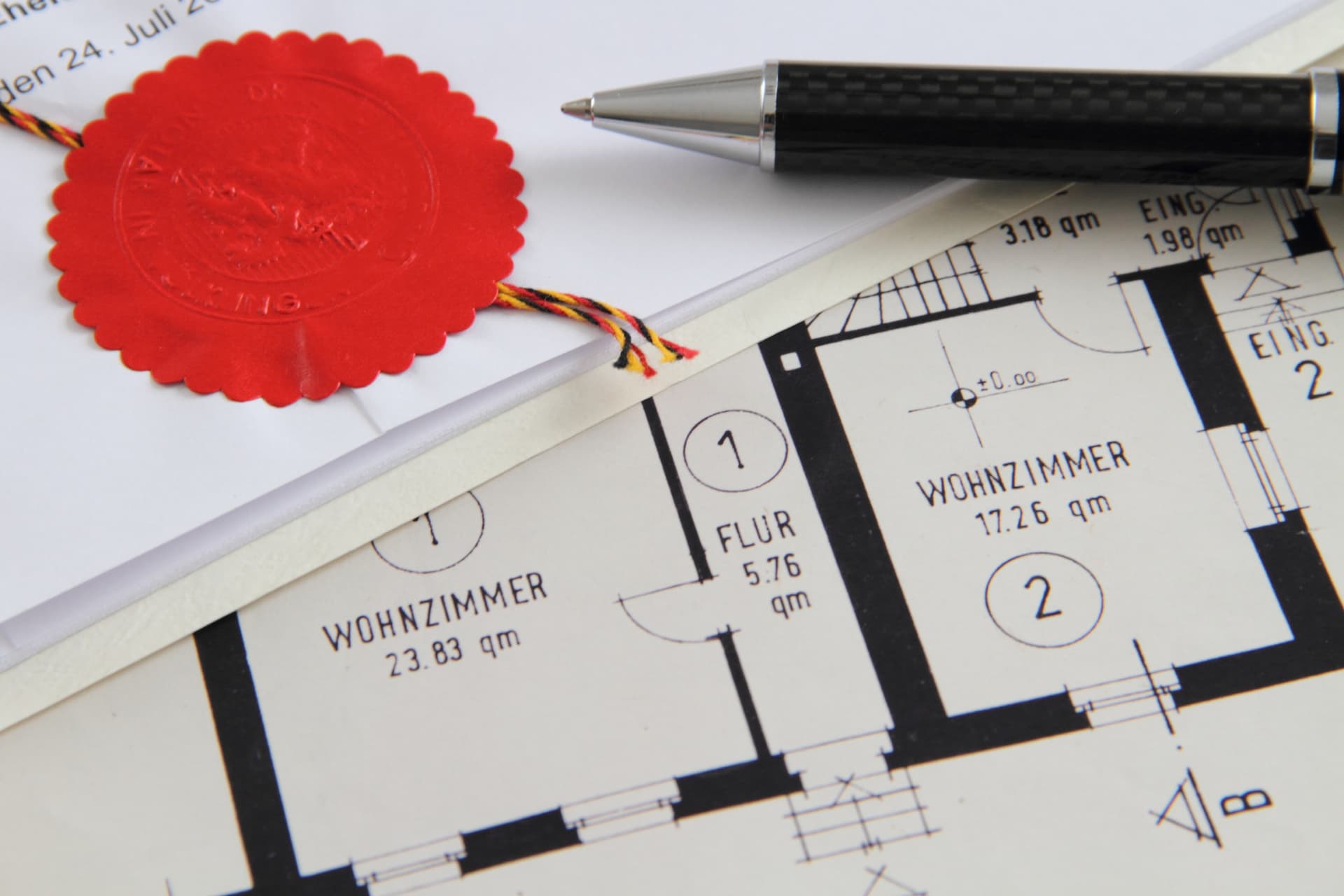The purchase of real estate and going to the notary

12.
August 2022
Going to a notary is mandatory in Germany when buying real estate. Only when the contract has been notarized, the sale of a property, such as an apartment, is legally binding. First-time buyers in particular should inform themselves in detail about the legal framework in advance. That's why we explain in this blog post what you need to bear in mind when going to the notary.
Tasks of the notary when buying real estate
The task of a notary in a real estate transaction is to keep an eye on the entire process and to guide you as the buyer through the often complex sales process. Among other things, he or she must check whether all the conditions for the sale are met - for example, there must be no more land charges in the land register. The notary also draws up the purchase agreement. At the notarization meeting, he must also explain to both contracting parties what rights they will receive with their signature, but also what obligations they will enter into. The notary must also point out the possible risks of concluding the contract.
In everything he does, he is obligated to neutrality. Other important steps in the process of selling a property that fall within the scope of a notary's duties are the change of ownership in the land register and the registration of the buyer's new land charge. The course of the sale and the agreements between you and the seller are written down and recorded in the notary contract. Since he has to certify the sale at the end, the notary is also liable for ensuring that everything is correct during the entire process of the real estate sale. This includes obtaining all the important documents and completing the necessary formalities. Beware: These tasks and duties apply to notaries in Germany. In other countries, including other EU countries, the situation can be very different.
These documents are required
As soon as you and the seller agree, you arrange a joint notary appointment. In Germany, you as the buyer usually choose the notary and - you also have to pay him. The most important documents you need to bring to the notary appointment include, first and foremost, the official proof of identity. This can be your identity card or your passport. It is crucial that you are clearly recognizable on the photo. Also important: your personal tax ID (consisting of 11 digits) - not to be confused with your tax number (consisting of 13 digits). However, the tax ID can also be submitted later. If you have taken out construction financing for the purchase, you must also have the relevant documents ready. This is because the loan will only be paid out once the new land charge has been notarized by the notary. To do this, the notary needs the land charge form from the bank where you took out the loan. Ideally, you should submit the paper to the notary two days before the appointment - but it can also be notarized later. Alternatively, you can ask your bank to send the form directly to the notary.
Costs to be borne by buyers
The costs for the notary when buying a house or apartment are usually borne by you as the buyer. The exact amount depends on the purchase price of the property. Usually, you can expect fees of about 1.5 percent of the purchase price. There is no need to compare prices at notaries: notary fees are regulated uniformly throughout Germany by the Law on Court and Notary Fees. If you are unable to attend the notary appointment in person, you can send a representative. However, for the contract to be directly valid, you must provide your representative with a notarial power of attorney. This will incur additional costs. If you send a representative without a power of attorney, the contract will have to be subsequently approved - and a fee will be charged for this as well. In general, the fewer appointments you have to make with the notary, the more time and money you save.
By the way: Buyers can deduct the expenses for the notary, the land transfer tax and the land register entry from their taxes.
This is how the notary appointment proceeds
The notarization appointment usually follows a clear procedure: After you and the seller have presented your proof of identity, the notary reads the text of the contract aloud. He explains the clauses, answers any open questions and clarifies any remaining ambiguities. You can also make last-minute changes to the contract at this point. Once all questions have been clarified, you, the seller and the notary sign the purchase contract. Once all signatures have been provided, the contract is legally binding. Beware: You shouldn't lightly cancel a notary appointment. If the notary has already completed the drafted contract, he will charge the costs in case of a cancellation to the person who commissioned him with the draft - normally you, the potential buyer of the property. If you have any questions about buying real estate and want to enjoy the many benefits of owning your own property as an owner, feel free to contact us at any time - as a reliable and experienced partner, we at ACCENTRO will assist you throughout the entire buying process and find the property that suits your needs in the best way.